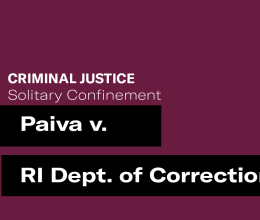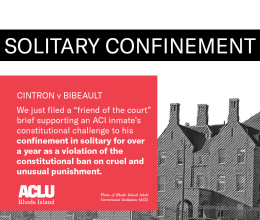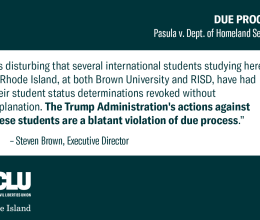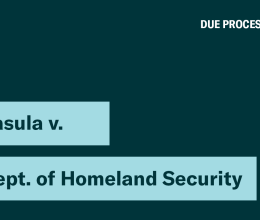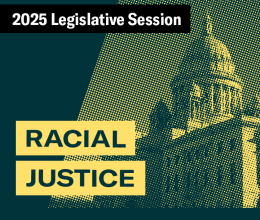Changes Mark Major Step Forward in Lawsuit Challenging the Legality of The Practice
The ACLU of Rhode Island and the R.I. Center for Justice announced today that, in response to mediation arising out of pending federal litigation challenging the R.I. Department of Corrections’ (RIDOC) use of solitary confinement on individuals at the ACI – including, among other practices, keeping some prisoners in lockdown for 22 to 24 hours a day for periods of a year or longer – significant changes have been made to the Department’s policies. While the litigation will continue, the ACLU called the policy revisions, which will take effect on July 30th, “a very positive development.”
The most significant policy change is that disciplinary confinement is now limited to a maximum of 30 days for the most serious offenses and 15 days for other serious offenses, and all prisoners will be medically and psychiatrically evaluated before being isolated.
Other key changes include the following:
- Corrections officials are barred from “stacking” disciplinary offenses; this will prevent individuals from being kept in disciplinary confinement for more than 30 consecutive days.
- After the maximum 30-day period, prisoners will either be returned to “general population” or referred to a new step-down program, known as the “Restorative Housing Program” (RHP), which consists of a progression of steps designed to return individuals to the general population after successful completion.
- In the RHP step-down program, prisoners will be entitled to, among other things, a TV and radio, ability to access the commissary, and access to educational materials and to services to help them with their rehabilitation.
- While in disciplinary confinement, prisoners must be given a minimum of two hours out-of-cell time every day during the first 15 days, and a minimum of three hours out-of-cell every day during the next 15 days; they will also be provided a tablet and reading material and allowed more visitation than currently authorized.
- The disciplinary code has been revised in numerous ways to better clarify the offenses that may lead to disciplinary confinement.
The new policies were developed in mediation with the assistance of the court, court-appointed experts, ACLU of RI cooperating attorneys, the Rhode Island Center for Justice, and RIDOC. The mediation process is ongoing and confidential and no settlement has been reached, but ACLU of RI cooperating attorney Lynette Labinger called the policies “a very positive development that we hope will contribute to a constructive settlement at a later date.” The ACLU indicated the attorneys would be monitoring implementation of the new policies and looking for feedback from those incarcerated at the ACI as they are implemented. In the meantime, the mediation will continue.
The lead plaintiff in this class-action lawsuit is Richard Paiva, a prisoner who recognized that RIDOC was not following court-ordered procedures adopted in the 1970s limiting the use of solitary confinement, and was instrumental in initially bringing the lawsuit back to the federal court for enforcement.
Regarding the policy changes being made, Paiva said: “While not perfect, I am satisfied with these new policy reforms, which will end the harmful use of long-term punitive segregation and solitary confinement at the ACI. The hard work and unrelenting dedication of my attorneys as well as all of the voices of the advocates on the outside to make these reforms a reality cannot be overstated.”
ACLU of RI cooperating attorney Sonja Deyoe noted: “With these changes, substantial steps have been taken to protect the mental and emotional well being of all inmates who are placed in disciplinary confinement and the newly formed Restorative Housing Unit. Importantly, inmates in these statuses will also be able to access educational materials and other behavioral management services which will ultimately assist them in their rehabilitation efforts and hopefully result in better societal reintegration upon their release.”
Natalia Friedlander, a consulting attorney with the Rhode Island Center for Justice, added: “The new RIDOC policies are steps in a positive direction that bring RIDOC closer in line with recognized national best practices. We look forward to continuing to work with people incarcerated at the ACI, RIDOC, and the court-appointed experts as we continue settlement discussions.”
RIDOC distributed to the ACI population today a memo summarizing the policy changes. In addition to the continuation of this court case, a separate lawsuit specifically challenging the use of solitary confinement on individuals with severe and persistent mental illness (SPMI) also remains pending.


